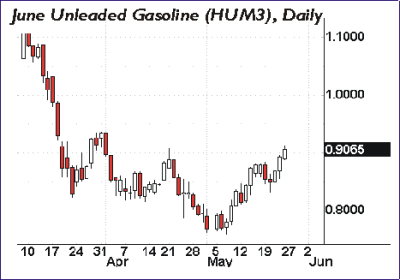Petroleum and Politics: A Combustible Mix in Venezuela
By Marc Dupee Special to TheStreet.com 05/27/2003 03:03 PM EDT
Millions of motorists hit the road over the Memorial Day weekend, kicking off the summer driving season. Some might have been pleased that prices at the gas pump have finally started to fall since the spike that accompanied the invasion of Iraq. But before drivers -- or holders of short positions in unleaded gasoline futures -- become too convinced that prices will continue dropping, consider the smoldering situation in Venezuela, OPEC's third-largest producer.
Just last December, labor and opposition groups staged a nationwide strike in an attempt to remove Venezuelan President Hugo Chavez from office. Tanker captains joined strikers at state-owned oil monopoly Petroleos de Venezuela S.A., also known as PDVSA, and refused to move cargo.
Output from the oil-dependent country of 25 million inhabitants plunged to 200,000 barrels a day from a prestrike level of 3.2 million barrels a day. The reduction in supply from Venezuela spurred rallies in unleaded gasoline and crude oil that took prices more than 12% higher during the month.
Chavez survived December's strike and de facto coup, and Venezuelan output rebounded sharply. However, the political and economic situation in the hands of Chavez continues to devolve. The resulting uncertainty greatly increases the odds of another round of social upheaval and threatens to disrupt the supply of oil and refined products from Venezuela.
At the heart of the maelstrom is the government's disenfranchisement of the opposition. A law has been proposed to censor the media and potentially quiet opposing voices. The "gagging law" needs only to be passed by the Chavez-dominated national assembly. But more devastating to the economy has been the imposition of foreign currency exchange controls on the country.
Dollar Politics
Opposition forces say that exchange controls are just a Chavez ploy to undermine the private sector. Venezuela exports oil and imports just about everything else. Dollars are required to complete transactions. Exchange controls have denied importers -- made up primarily of the private sector -- access to dollars to pay for goods brought into the country. Everything from food to medicine is running in short supply. The private sector, those least likely to vote for Chavez, are suffering in what appears to be a deliberate government attempt to damage the opposition's base of support. Businesses are closing, and official unemployment has reached 20%.
The result? The economy contracted a record 29% in the first quarter of 2003, and inflation is running in excess of 30%.
As Chavez seems to undermine the private sector, he's shoring up his political base by usurping key businesses. His administration has opened more than 100 government stores in poor neighborhoods and stocked the shelves with reduced-cost staples such as rice, beans and cooking oil. Cuban food brokers are helping the Chavez government with the procurement and bypassing established importers.
Thousands of employees who dissented or participated in last year's strike have also been fired from PDVSA, the nation's biggest employer, exacerbating the economic spiral. In short, Chavez's attempt to grab more power has made the already-volatile country a political powder keg, a situation that threatens U.S. oil and gasoline imports.
U.S. Connection
Venezuela -- along with Saudi Arabia, Mexico and Canada -- is one of the top suppliers of oil and refined products such as unleaded gasoline to the U.S. Before December's strike, Venezuela provided up to 17% of U.S. imports. The worsening social situation in Venezuela and its potential for disruption to U.S. supplies come not only at a time of increasing seasonal demand in the U.S., but also amid tightening domestic supplies.
U.S. environmental law requires that almost all of the high-density population centers from Boston to San Diego burn the less-polluting reformulated grade (RFG) of gasoline from March through October. Refineries have had trouble meeting demand in the past few years since RFG was mandated. This summer looks no different. Last week, the Energy Department said RFG stocks dipped by 10% to 33.3 million barrels as production fell. This occurred as inventories of the regular-grade unleaded gasoline rose.
Not Making the Grade
The volatile situation in Venezuela creates a lot of uncertainty and risk about supplies from that country. It also is taking a toll on supplies of refined RFG destined for the U.S. Normally, the country ships more than 2 million barrels of RFG a month. That's 6% of the current U.S. stockpile.
But for the past few months, PDVSA has consistently failed to get gasoline cargos certified as RFG. To move the refined product, PDVSA has resorted to selling cargoes as regular-grade unleaded gasoline rather than the cleaner-burning RFG grade.
Related Stories Debunking Deflation The Winner in the Devaluation Race The Ides of May Mean Dark Days in France
Why? Thousands of PDVSA employees were fired and replaced by loyalists. Among the fired were employees skilled in production and quality control methods that helped ensure consistent product. Political loyalty does not guarantee high quality.
The unleaded gasoline contract traded at the New York Mercantile Exchange conforms to the specifications for RFG and should reflect the fundamental situation of tightening supplies. The June contract (HUM3:NYMEX) closed at a one-month high Friday and broke the bearish symmetry that had helped define its downtrend. Look for this contract to test resistance at 0.9350 and possibly 0.9750.

Marc Dupee is an independent trader and co-author of the book The Best: Conversations With Top Traders. Dupee was formerly markets analyst and futures editor for TradingMarkets Financial Group. At time of publication, he held no positions in any securities mentioned in this column, although holdings can change at any time. Under no circumstances does the information in this column represent a recommendation to buy or sell stocks. While he cannot provide investment advice or recommendations, he invites you to send your feedback to Marc Dupee.
TheStreet.com has a revenue-sharing relationship with Amazon.com under which it receives a portion of the revenue from Amazon purchases by customers directed there from TheStreet.com.